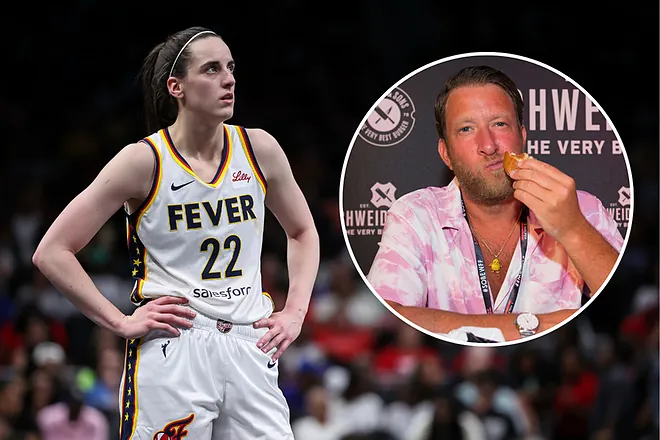
Dave Portnoy, the outspoken founder of Barstool Sports, is once again making headlines, this time for his vocal campaign to get Caitlin Clark off the Indiana Fever and onto a different WNBA team. Known for his brash takes and no-filter approach to sports commentary, Portnoy has ignited debate in the sports world with his assessment of Clark’s early experience in the league and her current team environment. As Clark begins her rookie season in the WNBA, Portnoy has made it clear he believes she deserves better.
Clark, the No. 1 overall pick in the 2024 WNBA Draft and one of the most anticipated rookies in league history, has entered the professional ranks under a spotlight few athletes ever experience. Her college career at Iowa redefined the women’s game, drawing massive audiences, breaking scoring records, and elevating the sport to unprecedented levels of popularity. But her transition to the Indiana Fever has not been as smooth as many hoped, and Portnoy is not holding back.
On social media and in recent podcast appearances, Portnoy has criticized the Fever’s coaching decisions, roster construction, and overall ability to support a generational talent like Clark. According to him, the organization is failing to maximize her potential, and it’s not just a missed opportunity for Indiana—it’s bad for the entire league.
“She’s the biggest draw in the WNBA, and they have her out there getting mauled every night,” Portnoy said in a recent episode of his podcast. “She’s got no protection, no help, and no plan around her. What are we doing? Get her out of there.”
His comments come amid a rough start to the season for the Fever, who have struggled to find chemistry and consistency despite having both Clark and last year’s No. 1 pick, Aliyah Boston, on the roster. The team has been plagued by turnovers, missed defensive assignments, and questions about player usage. Clark has shown flashes of brilliance—her deep threes, court vision, and competitive fire remain unmistakable—but she’s also faced relentless defensive pressure and little support from teammates, leading to difficult shooting nights and mounting frustration.
Portnoy’s campaign, while inflammatory to some, has struck a chord with a segment of fans who feel Clark is being wasted in a system not built to elevate her talents. Social media has seen hashtags like #FreeCaitlin and #GetClarkOut trending after every Fever loss, with some fans echoing Portnoy’s calls for a trade.
However, not everyone agrees with Portnoy’s take. Critics argue that he’s overreacting to a small sample size and underestimating the adjustment period all rookies go through—especially one carrying as much hype and pressure as Clark. WNBA analysts have pointed out that team-building takes time, and Indiana is a young team trying to develop cohesion around two budding stars.
“It’s a process,” said one league insider. “You don’t blow things up after a handful of games. Clark and Boston have the potential to be a special duo. The Fever are building something, but it won’t happen overnight.”
Still, Portnoy remains unconvinced. He believes the league has a responsibility to nurture its biggest star, and that means putting her in a position to thrive. Whether that’s in Indiana or elsewhere, he argues, should be up for serious discussion. He has even gone so far as to speculate about ideal landing spots for Clark, floating teams like the Las Vegas Aces or New York Liberty as organizations with the infrastructure and star power to elevate her game and marketability.
“If she was on the Aces right now, she’d be putting up 25 a night and they’d be selling out every arena,” he claimed. “Instead, she’s getting triple-teamed while her teammates stand around.”
Portnoy’s rhetoric isn’t just a fan outcry; it reflects a broader conversation about how the WNBA handles its emerging stars. The league is in the midst of a growth phase, with increased media exposure, higher attendance, and greater public interest than ever before. Clark is arguably the centerpiece of that movement. Her popularity has transcended the court, bringing new fans to the league, boosting television ratings, and selling out road games across the country.
With that in mind, Portnoy’s concerns, however exaggerated, touch on legitimate issues. How does the WNBA ensure its brightest talents are given the resources, coaching, and organizational support needed to succeed? Is it enough to rely on market parity and patience, or should there be a more aggressive approach to player development and star elevation?
For Clark, the situation is delicate. She has not publicly expressed any dissatisfaction with the Fever, and has maintained a professional, team-first approach in interviews. She acknowledges the learning curve and remains focused on improving each game. But even her most loyal supporters are starting to wonder whether Indiana is the right place for her to flourish long-term.
In the court of public opinion, the idea of moving Clark to a different team is gaining traction—thanks in no small part to Portnoy’s relentless messaging. He has taken to reposting clips of Clark being fouled without a call, highlighting poor offensive possessions, and drawing comparisons to NBA rookies who were surrounded by strong supporting casts.
“You wouldn’t stick LeBron on a G League team and say, ‘Just give it time,’” Portnoy said. “You build around your stars. You help them win. That’s how you grow the game.”
The Fever, for their part, have not directly responded to Portnoy’s commentary, but head coach Christie Sides and general manager Lin Dunn have continued to stress their commitment to building a winner around Clark and Boston. They’ve acknowledged the growing pains but remain steadfast in their belief that this young core can eventually contend.
“We’re not going to rush the process,” Sides said in a recent press conference. “We believe in our players, and we’re confident they’ll develop the chemistry needed to compete at the highest level.”
Whether or not Portnoy’s campaign gains traction with league executives or Clark’s camp remains to be seen. For now, it has added another layer to the already compelling story of Caitlin Clark’s WNBA journey. She remains the league’s most talked-about player, and every game she plays brings with it scrutiny, excitement, and a new round of commentary.
Portnoy, for better or worse, has ensured that conversation won’t die down anytime soon. His call to get Clark off the Fever has become part of the larger discourse about how women’s sports stars are managed and marketed. And in typical Portnoy fashion, he isn’t interested in waiting quietly.
“This league has a goldmine in Caitlin Clark,” he said. “And if they waste it, that’s on them. But I’m not going to sit here and pretend everything’s fine when it’s clearly not.”
Whether fans agree with him or not, one thing is certain: Dave Portnoy has made Caitlin Clark’s team situation a topic no one in the WNBA can afford to ignore.




